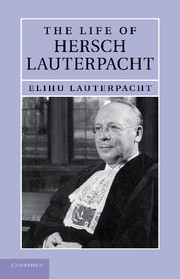Book contents
- Frontmatter
- Contents
- List of plates
- Acknowledgments
- List of abbreviations
- Prologue and introduction
- 1 Background and early years, 1897–1919
- 2 Vienna: research, engagement and marriage, 1919–1923
- 3 England and the London School of Economics, 1923–1937
- 4 Cambridge, 1937–1939: the Whewell Chair
- 5 The war years, Part I: September 1939–January 1941
- 6 The war years, Part II: February 1941–March 1942
- 7 The war years, Part III: April 1942–December 1944
- 8 Human rights
- 9 The years of practice, 1945–1950
- 10 1950–1954
- 11 The International Court of Justice, 1955–1960
- Epilogue: the man
- Appendix 1 The published writings of Sir Hersch Lauterpacht
- Appendix 2 Biographical and academic writings on Sir Hersch Lauterpacht
- Appendix 3 Obituaries of Sir Hersch Lauterpacht
- Appendix 4 Chronology of significant events in the life of Sir Hersch Lauterpacht
- Index
9 - The years of practice, 1945–1950
Published online by Cambridge University Press: 01 June 2011
- Frontmatter
- Contents
- List of plates
- Acknowledgments
- List of abbreviations
- Prologue and introduction
- 1 Background and early years, 1897–1919
- 2 Vienna: research, engagement and marriage, 1919–1923
- 3 England and the London School of Economics, 1923–1937
- 4 Cambridge, 1937–1939: the Whewell Chair
- 5 The war years, Part I: September 1939–January 1941
- 6 The war years, Part II: February 1941–March 1942
- 7 The war years, Part III: April 1942–December 1944
- 8 Human rights
- 9 The years of practice, 1945–1950
- 10 1950–1954
- 11 The International Court of Justice, 1955–1960
- Epilogue: the man
- Appendix 1 The published writings of Sir Hersch Lauterpacht
- Appendix 2 Biographical and academic writings on Sir Hersch Lauterpacht
- Appendix 3 Obituaries of Sir Hersch Lauterpacht
- Appendix 4 Chronology of significant events in the life of Sir Hersch Lauterpacht
- Index
Summary
1945
With the ending of the war, Hersch moved on to what may be called his ‘years of practice’ – activity that occupied much of his time until 1950 when, for tax reasons, he formally retired from the Bar. As will be seen, the addition of practice did not involve any lessening of his academic work in the university or in writing. It simply put him under greater pressure, to much of which he responded eagerly. The idea of being called on to provide specialist advice on important matters and to give a practical slant to his work gave him great satisfaction. And he was also able to turn much of the practical output into published material.
In the early months of 1945, Hersch was busy on Volume i of the sixth edition of Oppenheim, on taking his book on recognition out of cold storage and on editing the BYIL. There also seems to have been quite a bit of social activity. In acknowledging the gift of a book, Figgis, From Gerson to Grotius, he indicated that he intended to give a public lecture in the university to mark the tercentenary of the death of Grotius – ‘a lecture which will be to a very large extent a comparison of the Grotian and Machiavellian traditions.’
HL to EL, 21 February 1945
I found Figgis slightly superficial – plausible is perhaps the right word – in his remarks on the immorality of statesmen. He reproves Lord Acton for being too dogmatic in the matter. […]
- Type
- Chapter
- Information
- The Life of Hersch Lauterpacht , pp. 265 - 331Publisher: Cambridge University PressPrint publication year: 2010

